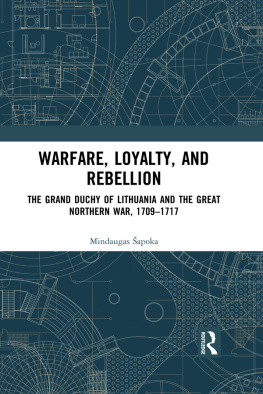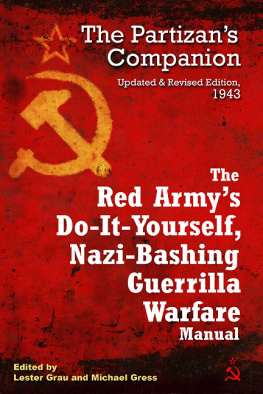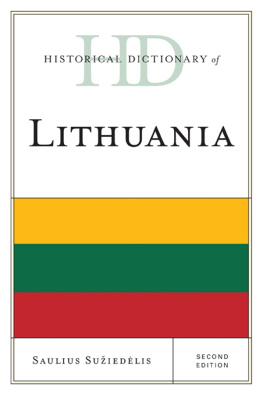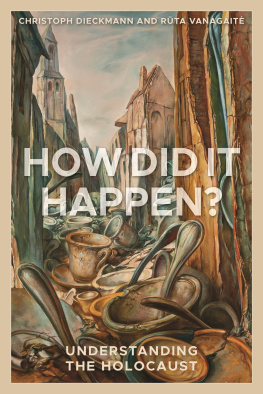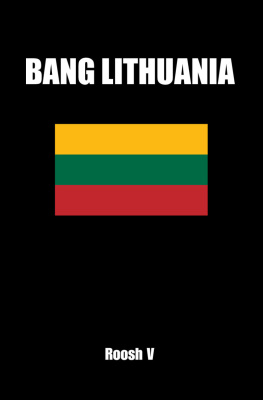This edition is published by PICKLE PARTNERS PUBLISHINGwww.picklepartnerspublishing.com
To join our mailing list for new titles or for issues with our books picklepublishing@gmail.com
Or on Facebook
Text originally published in 1962 under the same title.
Pickle Partners Publishing 2015, all rights reserved. No part of this publication may be reproduced, stored in a retrieval system or transmitted by any means, electrical, mechanical or otherwise without the written permission of the copyright holder.
Publishers Note
Although in most cases we have retained the Authors original spelling and grammar to authentically reproduce the work of the Author and the original intent of such material, some additional notes and clarifications have been added for the modern readers benefit.
We have also made every effort to include all maps and illustrations of the original edition the limitations of formatting do not allow of including larger maps, we will upload as many of these maps as possible.
GUERILLA WARFARE ON THE AMBER COAST
by
K. V. TAURAS
AUTHORS PREFACE
The historical narrative which unfolds in the following pages is almost completely unknown to Western readers.
Guerilla Warfare on the Amber Coast is an authentic, factual history of Lithuanian resistance against Soviet and Nazi oppressors between 1940-1952. This report is based on first-person accounts supplied by people who lived in Lithuania and who were able to reach the West; on statements by defected Soviet officials and military personnel, on articles of the Lithuanian underground press; and on items which have appeared openly in official Communist releases. For the most part, the report concentrates on Lithuanian guerilla operations against the Soviet colonial administration in Lithuania between 1944 and 1952.
Most of the first-hand experiences in this narrative were brought to the West by Juozas Luksa, a special emissary from the Lithuanian Freedom Army to Lithuanian institutions in the free world. As a freedom fighter he had used the aliases of Skrajunas , J. Daumantas , and Mikinis . In 1950 he returned to Soviet-occupied Lithuania to rejoin the LFA. According to Soviet sources, the NKVD captured and executed him in about October, 1951.
This narrative is published for the record and in the belief that it may serve a useful purpose at this particular juncture in world affairs. Interested readers will find extensive documentation and first-hand accounts of guerilla operations of the Lithuanian Freedom Army in the publications listed at the end of this report.
K. V. TAURAS
New York City
I hold it a noble task to rescue from oblivion those who deserve to be eternally remembered.
PLINY THE YOUNGER
INTRODUCTION
Although most of us have never visited Lithuania, the Amber Coast of the title, we are by no means unfamiliar with the tragic tale of the small nation, imbued with traditions as deep as the roots of its people, taking up arms against a gigantic invader. Perhaps most real to us of all these events in recent times is the Hungarian Revolution of 1956 which was played out on the worlds stage to a world-wide audience and became one of freedoms most historic acts of faith.
This was an experience indelibly engraved upon the entire free world. Of the struggle in Lithuania, we knew much less, and yet the memory of Hungarys few tragic days of freedom should help us in some measure to comprehend the sacrifice, the courage and the indomitable will of the Lithuanians whose story is told in the pages that follow.
In the past decade, too, we have become familiar with Soviet wars of national liberation. We have seen Soviet tanks as they approached to liberate Budapest. We have seen Cuba and the Cuban people as they have been liberated by Fidel Castro. We have now in Europe and in our own country many refugees who have fled in ragged terror from the glories of Soviet liberation. There is reflected in the faces of these exiles, many of them Lithuanian, a frustration and tragic loss which dwarfs even the most generous compassion extended to them by those living freely in the West. This book tells of some of these people who, risking their lives and everything else they had, determined that in Lithuania, at least, the spark of their nation would be kept alive.
It is not our business here to review the history of Lithuania. The history of this northern Baltic nation, now absorbed into the Union of Soviet Socialist Republics, is covered adequately enough for our purposes in the opening chapters of this book. Just as the Baltic Sea casts up pieces of amber on her shores when the wind whips the waves to fury, so, too, history throws upon this small nation the crises that ravage her hemisphere.
Since the Eleventh Century, Lithuania has been embroiled in the conflicts raging across Europe. In our own century alone she has been the victim of treachery which resulted in invasion by Germany from the west and usurpation by Russia from the east. Despite decades of cruel domination, however, the spirit of this nation has not broken. Quite the contrary, it has steadfastly persevered without even the spotlight of history to encourage it.
The story of the Lithuanian Freedom Army (LFA) fighting with inferior weapons but superior will against the brutal NKVD forces, daring to print and circulate newspapers and posters, destroying records of patriots, inciting the people to boycott mock elections, protecting the property of deported citizens, raiding Soviet supplies, rescuing many of those doomed to mass deportationin short, people dedicated to the will to resist tyrannyhas much to teach us in the West.
There is much in the so-called peaceful nation of Lithuania that parallels the so-called peaceful world today. In Lithuania from 1944 to 1952, no armies clashed on battlefields. No tanks engaged enemy tanks in battle. No war, as too many of us have come to define war, existed. And yet, neither was there peacepeace as we were once taught to expect it.
Small, highly organized, effective groups of guerillas thwarted within Lithuania the Soviet plans for collectivization. Small steel-nerved groups assassinated Soviet terror-masters sent to subdue their nation. Small unarmed groups of literate men wrote and distributed material denying the legality of Russian occupation and encouraging the people to resist. At no time were these groups who made up the Lithuanian Freedom Army of substantial size. At no time did they delude themselves into believing that they could drive the Soviets out of their nation. Their object was rather to harass, to delay, to attract the attention of the West, and above all to remind the people that they were victims of aggression, not partners in the glorious Soviet state.
In a world where this book can be written, peace alone is not and cannot be the proper objective of effective diplomacy. Peace alone cannot be the objective in a world where slavery is foisted upon whole nations under the guise of democracy; where blatant imperialist aggression is camouflaged as a war of national liberation. Hungary and Lithuania are but two of those already sacrificed to this kind of diplomacy.
There are episodes to come in this book which may shock and repel those who have come to regard modern warfare as either neatly uniformed armies facing each other across barricades or nuclear holocaust too horrible to envision. Guerilla warfare is brutality seen close up. But as our own government has belatedly come to realize, it is an effective weapon in many of the small nations currently slated for Soviet liberation.


